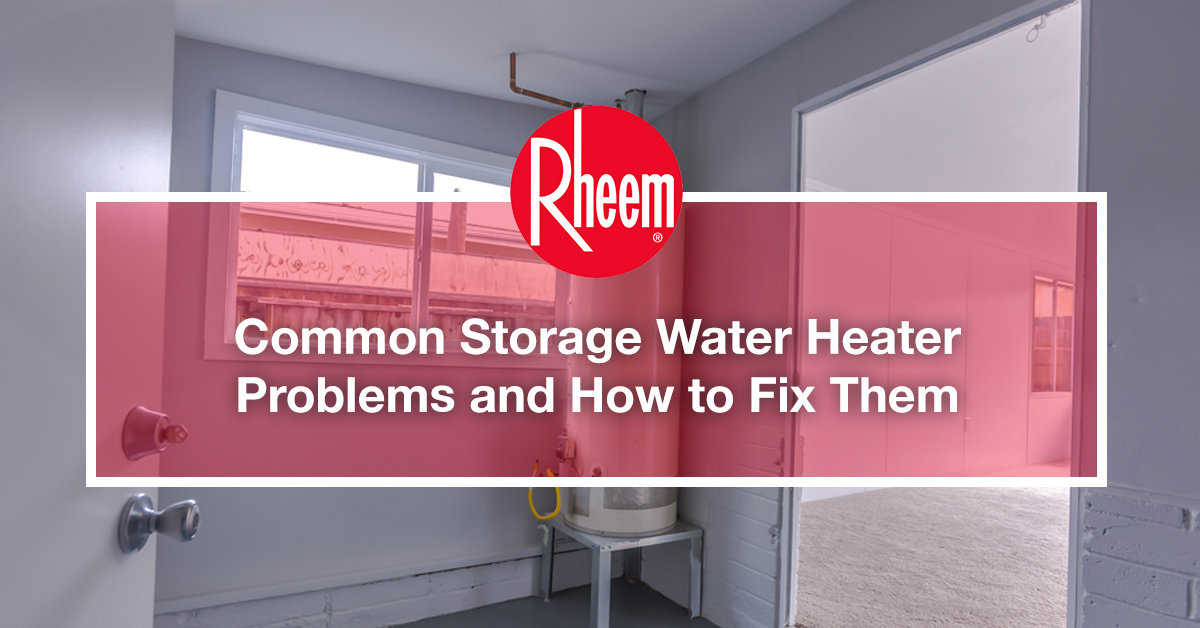
Storage water heater is probably one of the most taken-for-granted things in our homes.
It ensures that there is always hot water ready when we need it for showering, washing of clothes, or other household chores that require water. However, just like any other appliances, storage water heaters can sometimes fail to function properly. Especially when you leave it at a corner and simply forget about it. But doing so would only cost you more, as long-term neglect only causes harm and bigger issues to your water heater, or any other appliances, for that matter.
While some of the problems may be serious and may require a check-up from a professional, other issues could be easily resolved on your own. Read more below to learn about some of the common storage water heater problems you may face and how you can go about fixing them:

WHAT IT IS:
If you find that you’re waiting too long to get hot water from your tap, it could be due to the mineral deposits that may have settled on the bottom of your tank, which may restrict the incoming flow of water. This means that your tank will take a longer time to fill, which then leads to water taking longer time to heat up.
HOW TO FIX IT:
You can fix this by getting rid of built-up sediment by flushing water out of your storage water heater. If the problem is still not solved, contact the nearest authorized plumber in your area for help.

WHAT IT IS:
If your storage water heater is popping, creaking, or making rumbling noises, it is best to first find out where the noise is coming from. If the noise is coming from the pipes, it could be due to the sediment pressure build-up in the pipes.
HOW TO FIX IT:
Try lifting the lever up on the Pressure Relief Valve to see if the noise persists. If it does, contact the nearest authorized plumber in your area for help.

WHAT IT IS:
Cloudy or murky water is one of the best telltale signs that you should get your storage water heater checked. This is because minerals or bacteria may have accumulated in your tank and flowed out through your faucets or taps. This could also indicate that your water heater or house pipes are rusty.
HOW TO FIX IT:
Try draining the water out of the tank and refilling it with fresh batch of water. Doing so will help flush the accumulated minerals or bacteria out of your storage water heater. If your water is still discolored after replacing the water, you may have rusty pipes and may need to get new ones.

WHAT IT IS:
In most cases, hot water that smells bad or like rotten eggs, may be caused by occurring bacteria in water. However, there are cases wherein the foul smell is coming from damaged anode rods that are in the storage tank in the water heater.
Anode rods are self-sacrificing rods that dissolve overtime. Its dissolved particles are supposed to help reinforce the inner tank to prevent it from rusting. Normally, dissolved anode rods will not give the water a foul smell, but in unfortunate cases, your water may still end up smelling bad.
HOW TO FIX IT:
To eliminate the bad odor, you can first try flushing the water out of the tank and replacing it with a new batch of water to remove the bacteria.
If getting fresh batch of water in the tank doesn’t work, then you may be facing a tad more serious problem. You should call your plumber to replace your anode rods and to give your tank a good scrub.


WHAT IT IS:
If you notice water at the bottom of your tank, assess the situation first before you go on a shopping spree for a new storage water heater. First, try to determine if the water is dripping or leaking–then find where it is coming from.
If water is dripping from your Temperature and Pressure Relief (TPR) valve, then you have nothing to worry about, as this is perfectly normal; your TPR valve is merely doing its job relieving pressure and temperature by releasing droplets of water.
If water is leaking at your TPR valve, it could mean that your valve is congested with sediment or built- up particles.
If your storage water heater is leaking puddles of water from anywhere else other than the TPR valve, then this could be a sign that a part of your tank has been breached or cracked.
HOW TO FIX IT:
If you’re concerned about water droplets dripping from the TPR valve, you may want to consider installing a small pipe that connects the TPR valve with the nearest drain to allow the water droplets to drip out without wetting anything in your home.
If your TPR valve is leaking, then you should try lifting the lever on the TPR valve several times to loosen any stuck debris. If the leak persists, contact your nearest authorized plumber to replace the TPR valve.
However, if it is your tank that is leaking, you may need to get a new tank as soon as possible to prevent your tank from giving way any further and turning your home into a flood house.
As the saying goes, prevention is always better than cure. To avoid experiencing issues like the ones mentioned above, always invest in quality storage water heaters, such as the ones produced by Rheem.
With close to 100 years of experience in water heating, Rheem is known to provide advanced comfort and experience through its innovative and quality water heating products.
For more information on Rheem’s range of high-quality storage water heaters click here: /products/electric-storage-water-heaters.
Sources:
https://www.waterheaterhub.com/hot-water-smells-like-rotten-eggs-fix/
http://www.benfranklinplumbingac.com/blog/water-heater-failure-signs/
Subscribe

At Rheem, we strive to innovate
best-in-class products to lead the industry
in
environmental improvements.
Sustainability

